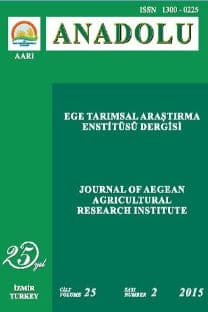Türkiye Makromantar Genetik Kaynakları . Ege Bölgesi
Macrofungi Genetic Resources of Turkey I. Aegean Region
___
- Aksu, Ş., A. Günay. 2001. Yemeklik mantar raporu. DPT Sekizinci Beş Yıllık Kalkınma Planı, Bitkisel Üretim Özel İhtisas Komisyonu Raporu. s. 343-378. Ankara.
- Anonim. 2016. Türkiye İstatistik Kurumu. www.tuik.gov.tr/
- Anonymous. 2015a. https://en.wikipedia.org/wiki/Sarcosphaera
- Anonymous. 2015b. Medicinal fungi. https://en.wikipedia.org/ wiki/ Medicinal_fungi
- Anonymous. 2015c. Mushroom expert. http://www. mushroomexpert.com
- Anonymous. 2015d. Queensland Mycological Society. http://qldfungi.org.au/resources-2/fungi-keys/fungi-keyagaricus
- Anonymous. 2015e. Rogersmushroom.www.rogersmushroom. com
- Anonymous. 2015f. Tom Volk Fungi. http://botit.botany.wisc. edu/toms_fungi/
- Anonymous. 2016. International Mycological Association. http://www.mycobank.org/
- Bao, E. 2004. Wild edible fungi a global overview of their use and importance to people. http://www.fao.org /docrep /018/ y5489e/y5489e.pdf
- Barron, G. 1999. Mushrooms of northeast north america midwest to new england. Lone Pine Publishing U.S.A. 336 pp.
- Doğan, H. H. 2001. Karaman yöresinin makrofungusları üzerinde taksonomik araştırmalar. Doktora Tezi, Selçuk Üniversitesi Fen Bilimleri Enstitüsü Biyoloji Anabilim Dalı, Konya, 453 s.
- Flück, M. 2002. Welcher pilz ist das? Franckh-Kosmos VerlagsGmbH& Co. Stuttgart. ISBN 3-440-08042-0 447 pp.
- Gminder, A., and Böhning T. 2007. Melyik ez a gomba? Franckh-Kosmos Verlags-Gmbh & Co. KG, Stuttgart. 320 p.
- Hall, I. R., S. L. Stephenson, P. K. Buchanan, W. Yun, and A. L. J. Cole. 2003. Edible and poisonous mushrooms of the world. Timber Press, Portland, Oregon U.S.A
- Hawksworth, D. L. 1991. The fungal dimension of biodiversity: Magnitude, significance, and conservation. Mycological Research 95: 641-655
- Hawksworth, D. L. 2001. The magnitude of fungal diversity: the 1.5 million species estimate revisited. Mycological Research 105: 1422-1432.
- Işıloğlu, M., M. H. Solak, F. Yılmaz ve H. Allı. 2008. Bozdağlar (İzmir-Manisa)'ın makrofungusları üzerinde taksonomik araştırmalar. Tubitak, TBAG 104T301, 122 s.
- Jong, S. C. 2005. The Market Potential for Medicinal Mushrooms. www.mushworld. com.
- Kuo, M. 2010. 100 Edible Mushrooms. University of Michigan Press, 329 pp.
- Lagarde, J. 1923. Discomycètes De France. Maison D'art Et D'édition.
- Lászió A., L. Csaba, V. Gizella. 1997. Ismerjük fel a Gombákat! 2. Felelos kiadó: Földes Tamás Ducsai György ügyvezeto igazgató. 125 pp.
- Lincoff, G. 1981. Simon & Schuster's Guide to Mushrooms. Simon & Schuster Inc., New York. 510 pp.
- Lincoff, G. H. 2009. Field guide to mushrooms. Knopf, Boroi Books, Chanticleer Press, Inc., New York. 926 p.
- Merdan, O. 2007. Marmaris ilçesi (muğla) makrofungusları üzerinde taksonomik çalışmalar. Yüksek Lisans Tezi, Muğla Üniversitesi Fen Bilimleri Enstitüsü. 144s.
- Oei, P. 1996. Mushroom cultivation with special emphasis on appropraite techniques for developing countries. Tool publications. Leiden, The Netherlands.
- Patocka, J., R. Pita, K. Kuca. 2012. Gyromitrin, mushroom toxin of Gyromitra spp. Mil. Med. Sci. Lett. (Voj. Zdrav. Listy). 81(2): 61-67
- Pekşen, A. Akdeniz, H. 2012. Organik ürün olarak doğa mantarları. Ormancılık dergisi. 34-40 s
- Pettenella, D., S. Kloehn. 2007. Mediterranean mushrooms: how to market them. In: Berrahmouni, N., Escuté, X., Regato, P., Stein, C. (Eds.), Beyond Cork--A Wealth of Resources for People and Nature. WWF Mediterranean and IPADE, pp. 52-68
- Saccardo P. A., and D. Fil. Saccardo. 1944. Sylloge fungorum omnium hucusque cognitorum. Edwards Brothers, Inc. Vol. 18. 843 p.
- Senn-Irlet B., J. Heilmann-Clausen, D. Genney, and A. Dahlberg. 2007 Guidance for conservation of macrofungi in Europe. Document prepared for the Directorate of Culture and Natural Heritage Council of Europe, Strasbourg, October 2007
- Sesli, E., and C. M. Denchev. 2014. Checklists of the myxomycetes, larger ascomycetes, and larger basidiomycetes in Turkey. 6th edn. Mycotaxon Checklists Online (http://www. mycotaxon.com/ resources/checklists/sesli-v106-checklist.pdf). 1-136.
- Smith, A. H., and N. S. Weber. 2009. The mushroom hunter's field guide. The University of Michigan Press. 316 p.
- Solak, M. H., M. Işıloğlu, H. Allı, E. Kalmış, F. Kalyoncu, F. Yilmaz, H. Baş. 2009. Akdeniz Bölgesinin Makrofungus Florasının Belirlenmesi, Fungaryum ve Misel Kolleksiyonlarının Oluşturulması. Tubitak proje no: 104T236.
- Solak, M. H., M. Işıloğlu, F. Gücin, İ. Gökler. 1999. Macrofungi of İzmir Province, Tr. J. of Botany 23: 383-390.
- Solak, M. H., M. Işıloğlu, E. Kalmış, H. Allı. 2007. Macrofungi of Turkey, Checklist Volume I, Üniversiteliler Ofset, Bornova, İzmir.
- Solak, M. H., M. Işıloğlu, E. Kalmış, and H. Allı. 2015. Macrofungi of Turkey, Checklist Volume II, Üniversiteliler Ofset, Bornova, İzmir.
- Stamets, P. 2000. Growing gourmet and medicinal mushrooms. Ten Speed Press. Third Edition. 574 pp.
- Taşkın, T., A. Tan, Ş. Aksu, E. E. Ak, A. Kır, L. G. Aykas, İ. Kara, T. Gezer, A. İnal 2010. Makro mantar genetik kaynakları araştırma projesi ara sonuç raporu, İzmir.
- Turgut, E. 2005. Ondokuz Mayıs Üniversitesi Kurupelit kampüsü (Samsun) alanındaki makrofungus florasının tespiti.
- Yüksek Lisans Tezi, Ondokuz Mayıs Üniversitesi Fen Bilimleri Enstitüsü Biyoloji Anabilim Dalı, Samsun, 117.
- ISSN: 1300-0225
- Yayın Aralığı: Yılda 2 Sayı
- Başlangıç: 1991
- Yayıncı: Ege Tarımsal Araştırma Enstitüsü
Farklı Sıra Aralarının Bazı Fiğ (Vicia sativa L.) Çeşitlerinin Tohum Verimine Etkisi
Cafer Olcayto SABANCI, HAKAN KIR, TAMER YAVUZ, Sibel BASKOY, Ali İhsan KARAYEL
Türkiye Makromantar Genetik Kaynakları . Ege Bölgesi
Ümmügülsün YILDIZ, Neşe ADANACIOĞLU, Lerzan AYKAS, Ayfer TAN, Erdinç OĞUR, Tefik TAYLAN
Türkiye Endüstri Bitkileri Genetik Kaynakları
A. Şemsettin TAN, Ali PEKSÜSLÜ, İsmail YILMAZ, Hasan KARTAL, Ayşegü L ALTUNOK MEMİŞ, Mehmet ALDEMİR, Lerzan AYKAS
Kirazlarda Yeni Bir Terbiye Sistemi: UFO
Hüsnü DEMİRSOY, DİLEK SOYSAL, İdris MACİT, Leyla DEMİRSOY
Türkiye Tıbbi ve Aromatik Bitkiler Genetik Kaynakları
Ünal KARİK, Erdinç OĞUR, Fatih ÇİÇEK
Türkiye'de Yayılış Gösteren Defne (Laurus nobilis L.) Populasyonlarının Meyve Özellikleri
Ünal KARİK, Fatih ÇİÇEK, Erdinç OĞUR, Mehmet TUTAR, Fırat AYAS
